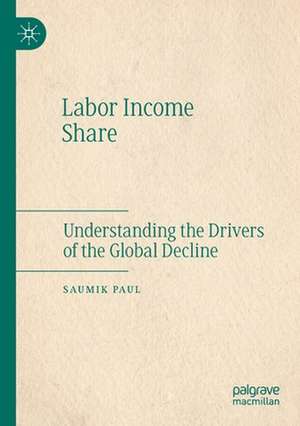Labor Income Share: Understanding the Drivers of the Global Decline
Autor Saumik Paulen Limba Engleză Paperback – 3 oct 2021
| Toate formatele și edițiile | Preț | Express |
|---|---|---|
| Paperback (1) | 639.73 lei 6-8 săpt. | |
| Springer Nature Singapore – 3 oct 2021 | 639.73 lei 6-8 săpt. | |
| Hardback (1) | 645.14 lei 6-8 săpt. | |
| Springer Nature Singapore – 2 oct 2020 | 645.14 lei 6-8 săpt. |
Preț: 639.73 lei
Preț vechi: 752.63 lei
-15% Nou
Puncte Express: 960
Preț estimativ în valută:
122.44€ • 127.33$ • 102.46£
122.44€ • 127.33$ • 102.46£
Carte tipărită la comandă
Livrare economică 15-29 martie
Preluare comenzi: 021 569.72.76
Specificații
ISBN-13: 9789811568626
ISBN-10: 9811568626
Pagini: 281
Ilustrații: XXII, 281 p. 93 illus.
Dimensiuni: 148 x 210 mm
Greutate: 0.4 kg
Ediția:1st ed. 2020
Editura: Springer Nature Singapore
Colecția Palgrave Macmillan
Locul publicării:Singapore, Singapore
ISBN-10: 9811568626
Pagini: 281
Ilustrații: XXII, 281 p. 93 illus.
Dimensiuni: 148 x 210 mm
Greutate: 0.4 kg
Ediția:1st ed. 2020
Editura: Springer Nature Singapore
Colecția Palgrave Macmillan
Locul publicării:Singapore, Singapore
Cuprins
1. Introduction.- 2. Definition, Measurement, and Conceptual Issues.- 3. Global Trends in Labor Income Share: Country Level.- 4. Global Trends in Labor Income Share: Sector Level.- 5. Global Trends in Labor Income Share: Firm Level.- 6. The Economic Forces Behind Labor Income Share: Theory.- 7. The Economic Forces Behind Labor Income Share: Empirics.- 8. Potential Areas of Future Research.- 9. Concluding Remarks.
Notă biografică
Saumik Paul has been working on the labor income share for over four years. He has edited books and published journal articles on the same topic. His ongoing research focuses on the drivers of the labor income share at the firm and sector level. He is also interested in the measurement issues of the labor income share. Saumik is currently employed at Newcastle University, UK and holds affiliation with the Institute of Labor Economics (IZA) and Household in Conflict Network (HiCN).
Textul de pe ultima copertă
This book is about labor income share, which measures the share of national income paid in wages. The global share of income going towards labor is declining, which suggests a more unequal distribution of income. This has sparked debates about fair distribution of personal incomes among academics and policymakers alike. This book joins the discussion by bringing together recent developments in theoretical and empirical research on labor income share and novel insights on the measurement of the labor income share. The aim of this book is to help design policies to reduce inequality and provide useful knowledge to academics, policymakers from government agencies, policy aides in research institutions and think tanks, and broader audiences from public and private organizations.
Saumik Paul has been working on the labor income share for over four years. He has edited books and published journal articles on the same topic. His ongoing research focuses on the drivers of the labor income share at the firm and sector level. He is also interested in the measurement issues of the labor income share. Saumik is currently employed at Newcastle University, UK and holds affiliation with the Institute of Labor Economics (IZA) and Household in Conflict Network (HiCN).
Caracteristici
Brings quantitative analysis and data to the macro-economic question of labor income share Explores the role of globalization in disempowering labor worldwide Proposes realistic solutions to the phenomenon of "useless populations"
